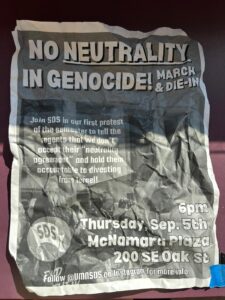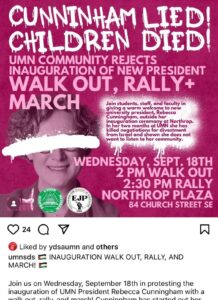The beginning of the 2024-25 academic year coincides with Elul, the Hebrew month preceding the High Holidays, considered a time for personal reflection on the preceding year and hopes for the next.
In Minnesota and around the country, there’s been a collective assessment of universities’ responses to last year’s anti-Israel hostility and antisemitism – and how they plan to address the fresh chaos protestors are vowing.
In Washington, the House of Representatives held a June hearing on the crisis of campus antisemitism. The same month, a state Senate hearing in St. Paul focused on the toxicity at the University of Minnesota.
The U is under investigation by the U.S. Department of Education’s Office of Civil Rights following a complaint of “pervasive antisemitism” and other discrimination, signed by former regent Michael Hsu, and Richard Painter, professor of law at the U.
“This is a critical issue not just for the Jewish community, but for our democracy,” Painter, who along with Hsu is not Jewish, said in a media interview.
Congressman Tom Emmer demanded (R-MN CD6), in a July letter to new U President Rebecca Cunningham, that she immediately address the “culture of antisemitism” and work to “undo the damage done by your predecessor.” He also asked for specifics concerning the U’s plan to protect Jewish students.
Campus Climate
Some examples of the unchecked anti-Israel, anti-Zionist, and antisemitic elements at the U last year include:
Encampments; antisemitic chants; assailants shattering windows at Minnesota Hillel; pro-Hamas graffiti glorifying Oct. 7; flyers with slogans like “Nothing but hate for Israel and Zionism” and “Solidarity means attack,” and images of armed fighters; protestors carrying the flag of a Gaza-based terrorist group responsible for suicide attacks against Israeli civilians; ubiquitous anti-Israel commentary, including from faculty during class in courses having nothing to do with the conflict; anti-Israel faculty statements on official U department websites.
The hostility affects not only Jewish students but also Jewish faculty and staff. One employee, who was granted anonymity to speak with TC Jewfolk, said it has been wrenching to work amidst the hate on campus.
“I feel very nervous about being on campus after last year,” they said. “As an employee, the antisemitic, anti-Zionist issues started right away on Monday, Oct. 9. Someone I work with felt emboldened to publicly refer to Hamas as ‘freedom fighters’ and said ‘eventually the oppressed will shake off their oppressor,’” they said. “This was all particularly painful to me as a Jew and an aunt to a soldier who barely survived the 10/7 attack. There were no consequences for this individual because the speech was deemed allowable. This has affected my feelings about work and ability to function normally.”
According to Dr. Natan Paradise, professor and director of the U’s Center for Jewish Studies, life for Jews on campus is a glass half-full/glass half-empty situation.
“The climate at the U for Jewish members of the campus community is bad,” he said. “It’s not as bad as at many other institutions, not anywhere near as bad as at many of the institutions you read about,” he added.
Paradise said that the climate is still bad enough that “too many Jewish students” have good reason to hide their Jewish identity, and certainly any affinity for Israel.
“And there are staff hiding their identity, and some faculty also. The faculty from Israel are in a particularly precarious position,” he said. “I know more than a few staff members who have changed their employment positions on campus, or left the University entirely, in order to escape a hostile climate.”
Paradise said that the U is making efforts for these employees, but the actions fall short.
“The University overall is not doing enough to protect them, nor is it adequately acknowledging the ongoing harm,” he stated. “And if you ask me if I think the Bias Response Network is adequately responsive, I’ll say I am still waiting to hear of an acceptable and appropriate response from them to a single complaint regarding anti-Jewish bias.”
Paradise’s critique of the U’s missteps is tempered by the extreme difficulties faced by fellow directors of Jewish studies programs across the country, with whom he’s in regular conversation.
“[The U is] willing to talk to those of us in Jewish studies who have actual expertise, and when they remember to ask our advice they are usually responsive to it. Not always and not wholly, and not always in the way we hoped, but at least we feel like we are not entirely shut out, and we can go back to them and try again.”
At other institutions? Paradise says his colleagues’ administrations won’t take their calls or respond to emails.
Paradise highlighted some encouraging support from within his home college at the U, such as the interim director for DEI reaching out to him multiple times about what could be done to improve the campus climate for Jews.
Last year: Amnesty over enforcement
If experience is the best teacher, what did disruptive students learn from the U’s appeasement tactics last year and how will those lessons impact this year?
In its May 2024 deal with protestors to end the illegal encampment, the U conceded to numerous demands, including amnesty from the U for violating its policies. “[W]e will agree to not pursue University disciplinary action against any students or employees for participating in the encampment of the past few days,” the U agreed.
The U also pledged to seek leniency on behalf of nine individuals arrested for trespass after they refused to leave the encampment after repeated warnings. Prosecutors then exercised their discretion to dismiss the criminal charges.
One of the arrested protesters, Sasmit Rahman, said to MPR News: “It really speaks to the pressure administration was under,” she said. “I know in our correspondence, the university was particularly scared of us doing something to disrupt students’ finals or the commencement ceremonies. And so I think, like, they were very desperate to negotiate with us, which is why they conceded to so many of our demands. And I think that’s like an incredible win for the coalition.”
State Senator Ron Latz addressed the danger of the U’s strategy during the June hearing.
“I am particularly concerned that the manner of sanctions or lack of sanctions for those who violated the law would have the effect of encouraging future similar disruptions,” he said. “It seems to me that [it] will only be a signal to future people intending to protest that they can do it with impunity and without facing any real sanctions.”
“There’s no doubt [that’s] a legitimate concern,” replied Interim U President Jeff Ettinger, who went on to describe the time pressure and various considerations officials faced.
The anonymous U employee said: “I’m very concerned that the lack of consequences for the students who violated school policy and the law last year will embolden protestors this year. As an employee, I’m in charge of enforcing policy and making sure my students follow the University Code of Conduct. If a student violates this, there should be consequences.”
The U’s resolve will be tested
Jewish groups, both national and local, have demanded the U take decisive action and enforce policies to protect against the pervasive intimidation Jews on campus experienced and the widespread disruptions for all students.
“Ensure these policies are well-publicized and enforced,” Iola Kostrzewski of ADL told TC Jewfolk.
This year, the U’s official communications signal an intention to step up and enforce existing policies.
Anti-Israel activists, in turn, are open about their intention to continue their disruptions, and their messaging remains obsessed with Israel.
The first protest march occurred even before the first day of classes this year in response to the Regents’ decision to reject a key protestor demand: divestment from Israel.
WCCO News reported that organizer Faye Hodges said at a press conference after the Regents’ meeting: “[We’ll] continue to do a lot of the same disruptive actions that we had over the past year. And I think that, again, we don’t want to make the regents’ lives comfortable and our university functioning as usual while our tuition dollars are being spent on something that over 70% of the student body voted against.”
A second protest occurred during the first week of school, advertised online and in flyers posted on campus.

A crumpled up flier for an event titled “No Neutrality In Genocide”. (Photo by Elise Long)
Local activist publication Fight Back! News covered the first protest with an article that states: “At the same meeting as the neutrality vote, President Cunningham introduced a new policy that would effectively make any sort of protest on campus illegal.”
This account is contradicted by the recording of the meeting posted by the U, in which Cunningham said: “To reiterate, these policies are not new, and they were not altered at all in response to the events of last spring or last year. These are existing university policies. They were developed through shared governance and approved by our Regents years ago.”
The Regents’ meeting materials also stated: “When civic engagement occurs, we seek to understand the nature of the event to protect protesters and to support students, staff and faculty who may feel targeted.” But, “engagement that is inconsistent with University policies becomes civil disobedience.”
Civic disobedience is exactly what some student activists are preparing for, according to their social media posts for weekly trainings.
During her remarks at the Regents’ meeting, Cunningham highlighted the importance of the U campus community carrying out its work without “fear or intimidation.” In her conclusion, she stated: “How we treat each other, and how you treat each other, and express our views this semester will signal how we move forward together as a community.”
The virulent Anti-Israel activists are already signaling how they intend to move forward: by protesting Cunningham’s inauguration ceremony and defacing her image.

A social media post for a walkout, rally and march to protest UMN President Rebecca Cunningham’s inauguration.



















